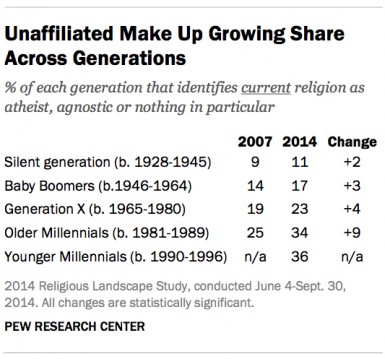(RNS) A few years ago, when atheist activists asked U.S. Sen. David Vitter, a Louisiana Republican, to tone down a Christian-oriented message to voters, they were told, “There aren’t any atheists in Louisiana.”
But according to a new Pew Research Center survey, not only are there atheists in Louisiana, there are agnostics and “nones” — people who say they have no religious affiliation — too.

The May 12 survey found that 2 percent of Louisianans are atheist, another 2 percent are agnostic, and 13 percent are unaffiliated “nones.” Those numbers are amplified nationally, where the religiously unaffiliated have grown to about 22 percent, or 56 million Americans, up 19 million people from 2007.
“It’s easy to ignore 2, 3 or 4 percent of the population,” said Kelly Damerow, interim director of Secular Coalition for America, who met with Vitter’s staff in April 2013. “But with this state-by-state breakdown we can now go into their offices and say, ‘Here’s your state.’ It’s hard to ignore almost 1 in 5 people.”
As the 2016 election approaches, atheist, humanist and other freethinking activists are encouraged. They say their longtime goal of creating a cohesive and formidable secular voting bloc from the diverse and scattered category of the nonreligious has taken new life from the study — and could carry them far if they use the data wisely.
“It is going to translate into a lot of political clout and social acceptance if we manage this correctly,” said David Silverman, president of American Atheists.
Silverman, Damerow and other atheist and humanist activists have different strategies but agree that the hurdles are steep. Nonbelievers tend to be nonjoiners.
“We don’t herd cats, we lead them,” Silverman said. “We don’t say, ‘Hey everybody, if you want to be an atheist you have to join American Atheists,’ because they are going to tell you what do with that suggestion.”
Instead, American Atheists’ take-away is that the organization should amplify its emphasis on church and state issues, such as the tax-exempt status of churches and the reciting of the Pledge of Allegiance, and reframe them as economic issues, education issues and health issues.
“These are all issues that can be used to bind atheists, by any name, together,” Silverman said. “We hope that will be recognized by politicians.”
Damerow, whose organization lobbies Congress on behalf of 17 nontheist organizations, including American Atheists, the American Humanist Association and the Freedom From Religion Foundation, said nine sitting members of Congress attended Lobby Day, the Secular Coalition’s signature annual event, in the last nine years. That number should grow.
“Candidates who go to prayer breakfasts are fighting over a disappearing constituency,” she said. “We won’t need to beg for the recognition of candidates.”
But John C. Green, director of the Ray C. Bliss Institute of Applied Politics, said that if atheists want a voting bloc, they should look to the evangelicals’ playbook. In the 1970s, evangelicals were as diverse as the nonbelievers are now. Evangelicals disagreed on theology but found common ground in political issues such as abortion and marriage.
“Jerry Falwell didn’t get along with Pentecostals, but they were able to convince their people that for political purposes they could get along,” Green said. “I can see a very similar thing happening with the Secular Coalition and other organizations that are trying to get conversations going with people not involved in organized religion.”
But there is another hurdle — polls consistently show that Americans are least likely to vote for an atheist. David Gutterman, co-author of the forthcoming “Political Religion and Religious Politics,” said that only coalition-building can combat that bias. “If you start with atheism as the place to bring people to, I think that is the wrong path,” he said.
Ryan Cragun is even less optimistic. A nonbeliever and sociologist of religion at the University of Tampa, he said that even though the religiously unaffiliated are now second only to evangelicals in size, the membership rolls of major atheist and humanist organizations only total about 100,000.
“Yes, maybe 23 percent of the population is nonreligious, but there is maybe 1 million that you could reach through these groups,” he said. “Until they can say 15 million Americans will vote against you or your party, no one is going to take them seriously.”








